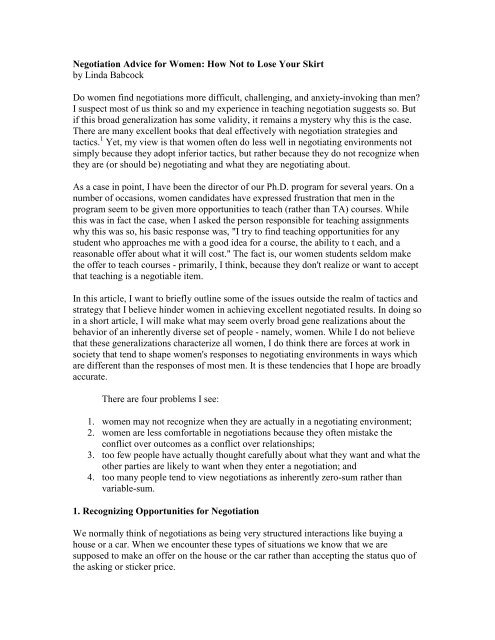Negotiation Advice for Women: How Not to Lose Your Skirt by Linda ...
Negotiation Advice for Women: How Not to Lose Your Skirt by Linda ...
Negotiation Advice for Women: How Not to Lose Your Skirt by Linda ...
Create successful ePaper yourself
Turn your PDF publications into a flip-book with our unique Google optimized e-Paper software.
<strong>Negotiation</strong> <strong>Advice</strong> <strong>for</strong> <strong>Women</strong>: <strong>How</strong> <strong>Not</strong> <strong>to</strong> <strong>Lose</strong> <strong>Your</strong> <strong>Skirt</strong><strong>by</strong> <strong>Linda</strong> BabcockDo women find negotiations more difficult, challenging, and anxiety-invoking than men?I suspect most of us think so and my experience in teaching negotiation suggests so. Butif this broad generalization has some validity, it remains a mystery why this is the case.There are many excellent books that deal effectively with negotiation strategies andtactics. 1 Yet, my view is that women often do less well in negotiating environments notsimply because they adopt inferior tactics, but rather because they do not recognize whenthey are (or should be) negotiating and what they are negotiating about.As a case in point, I have been the direc<strong>to</strong>r of our Ph.D. program <strong>for</strong> several years. On anumber of occasions, women candidates have expressed frustration that men in theprogram seem <strong>to</strong> be given more opportunities <strong>to</strong> teach (rather than TA) courses. Whilethis was in fact the case, when I asked the person responsible <strong>for</strong> teaching assignmentswhy this was so, his basic response was, "I try <strong>to</strong> find teaching opportunities <strong>for</strong> anystudent who approaches me with a good idea <strong>for</strong> a course, the ability <strong>to</strong> t each, and areasonable offer about what it will cost." The fact is, our women students seldom makethe offer <strong>to</strong> teach courses - primarily, I think, because they don't realize or want <strong>to</strong> acceptthat teaching is a negotiable item.In this article, I want <strong>to</strong> briefly outline some of the issues outside the realm of tactics andstrategy that I believe hinder women in achieving excellent negotiated results. In doing soin a short article, I will make what may seem overly broad gene realizations about thebehavior of an inherently diverse set of people - namely, women. While I do not believethat these generalizations characterize all women, I do think there are <strong>for</strong>ces at work insociety that tend <strong>to</strong> shape women's responses <strong>to</strong> negotiating environments in ways whichare different than the responses of most men. It is these tendencies that I hope are broadlyaccurate.There are four problems I see:1. women may not recognize when they are actually in a negotiating environment;2. women are less com<strong>for</strong>table in negotiations because they often mistake theconflict over outcomes as a conflict over relationships;3. <strong>to</strong>o few people have actually thought carefully about what they want and what theother parties are likely <strong>to</strong> want when they enter a negotiation; and4. <strong>to</strong>o many people tend <strong>to</strong> view negotiations as inherently zero-sum rather thanvariable-sum.1. Recognizing Opportunities <strong>for</strong> <strong>Negotiation</strong>We normally think of negotiations as being very structured interactions like buying ahouse or a car. When we encounter these types of situations we know that we aresupposed <strong>to</strong> make an offer on the house or the car rather than accepting the status quo ofthe asking or sticker price.
<strong>How</strong>ever, there are numerous situations we encounter where we do accept the status quoand do not think <strong>to</strong> negotiate. This is a mistake and it is more likely <strong>to</strong> be made <strong>by</strong>women. Again, as direc<strong>to</strong>r of our Ph.D. program, a student remarked <strong>to</strong> me that two malestudents had gone through our May graduation ceremony even though they weren'tdefending their theses until late summer. She was disappointed because she had wanted<strong>to</strong> go through the ceremony but knew she wasn't defending until late summer. Theproblem was that she never asked me if she could go through graduation (I would havesaid yes). Both male students had asked. Because she failed <strong>to</strong> recognize this as anopportunity <strong>for</strong> negotiation, it led <strong>to</strong> an inferior outcome <strong>for</strong> both of us (I would havebeen happy <strong>to</strong> see her go through graduation).My main conclusion from these and other experiences is that women need <strong>to</strong> becomemore assertive in pursuing their objectives. To do this, women need <strong>to</strong> regard moresituations as negotiations and consider all (or most) things as negotiable. <strong>Women</strong> mus trealize that opportunities and outcomes must be claimed <strong>for</strong> oneself rather than waiting<strong>for</strong> them <strong>to</strong> be offered.2. Anxiety about NegotiatingI have found that there are big differences in the degree <strong>to</strong> which men and women arecom<strong>for</strong>table negotiating, even once it is unders<strong>to</strong>od that negotiation is necessary. For thepast ten years, I have taught a negotiation class in our masters program in public policyand management. For their first assignment, the students describe why they have chosen<strong>to</strong> take this class (it is not required). There is an enormous difference between the typicaldescriptions <strong>by</strong> women and men -- I'm quite confident that, reading them anonymously, Icould separate out the women's assignments from the men's. The vast majority of femalestudents report reasons such as "I'm very uncom<strong>for</strong>table conducting negotiations so Ineed <strong>to</strong> <strong>for</strong>ce myself <strong>to</strong> do them <strong>to</strong> gain confidence". Female students also describe howthey avoid situations that involve negotiations ("I had my brother negotiate the purchaseof my car <strong>for</strong> me") or simply take what is offered them ("I'd rather accept a job offer as isthan face the anxiety of negotiating <strong>for</strong> more" or "Asking <strong>for</strong> more money could reallyspoil my relationship with my new boss"). They report that they are taking my course <strong>to</strong>become more assertive in this domain. Male students tend <strong>to</strong> report reasons such as "Iwant <strong>to</strong> learn ways <strong>to</strong> win more negotiations."Why the difference between men and women? While the exact mechanism remainsunclear, I believe that this level of discom<strong>for</strong>t has <strong>to</strong> do with the fact that women tend <strong>to</strong>view the conflict inherent in negotiating as jeopardizing relationships that we value. Inmost negotiating situations, substantive and relationship issues are largely independentand should be treated that way in negotiating environments. 2 For example, I can have agood relationship with my Dean that rests on clear communication and mutual respectand is independent of the resolution of my salary, teaching load, and committeeassignments. Men are more likely <strong>to</strong> operate under the assumption of this independence.<strong>Women</strong> are more likely <strong>to</strong> either avoid negotiation al<strong>to</strong>gether or <strong>to</strong> trade off potentialgains on substantive issues <strong>to</strong> insure against perceived relationship threats.
<strong>Women</strong> need <strong>to</strong> find ways <strong>to</strong> combat their anxiety over negotiation. Realizing thatnegotiation is an accepted and expected activity and can be conducted assertively whilemaintaining strong relationships should be a first step in doing this.3. Thinking Carefully about Interests and PrioritiesIt may seem an obvious point, but it is difficult <strong>to</strong> reach your objectives in a negotiation ifyou are unsure about what you are trying <strong>to</strong> achieve. I'm not suggesting that people arecompletely uncertain about their preferences but only that they haven' t given them asmuch thought as they should. Lots of people ask me <strong>for</strong> negotiation advice about wha<strong>to</strong>ffers they should make and what strategies they should use. Instead of answering them Iusually ask them what their objectives are <strong>for</strong> the negotiation -- what are their underlyinginterests and what are their priorities over the issues that are <strong>to</strong> be negotiated. I am alwaysstruck <strong>by</strong> how little thought is given <strong>to</strong> identifying these.This confusion even takes place in business contexts. I occasionally conduct trainingseminars <strong>for</strong> organizations <strong>to</strong> improve the negotiation skills of their employees. In oneparticular organization, I was teaching their national sales staff skills ways <strong>to</strong> improve thecontracts they negotiated with clients. The contracts they negotiated involved multipleissues. I gave them 12 contracts I had generated <strong>by</strong> varying the outcomes on each of theissues and asked each of them <strong>to</strong> rank them from best <strong>to</strong> worst. There was virtually noagreement among the staff as <strong>to</strong> what were the best and worst contracts. They also foundthis exercise extremely difficult <strong>to</strong> do. Furthermore, very few people had ranked thecontracts similarly <strong>to</strong> the rankings supplied <strong>by</strong> their managers. If the sales staff wasunsure what <strong>to</strong> negotiate and if there is a wide range of opinions about what should beaspired <strong>to</strong>, it would be futile <strong>to</strong> devote a lot of energy <strong>to</strong> building skills in negotiationstrategy.My advice here is that it is extremely important <strong>to</strong> enter in<strong>to</strong> a negotiation with a clearidea of your negotiation objectives and your preferences over the issues <strong>to</strong> be negotiated.For example, in a job negotiation, how important is salary relative t o teaching load andresearch support? Furthermore, do not neglect the other sides' objectives and preferences.A successful negotiation requires agreement <strong>by</strong> both (or many) parties. There<strong>for</strong>e, findingcreative ways <strong>to</strong> reach a good outcome <strong>for</strong> yourself while still meeting the objective ofthe other side is critical.4. Viewing <strong>Negotiation</strong> as Zero-Sum Rather than Variable-SumWhile there is surely a distributive or competitive aspect <strong>to</strong> negotiations, it is a mistake <strong>to</strong>view all negotiations as zero-sum. In negotiations with multiple issues there are efficientand inefficient outcomes that could be reached. Especially when t he status quo isinefficient, negotiation can improve the outcomes of all parties.Viewing negotiations as strictly competitive is common and inhibits the ability <strong>to</strong> reachefficient outcomes. 3 The key <strong>to</strong> reaching these efficient outcomes is the ability <strong>to</strong>
understand how the underlying interests of both sides can be met and how differences inpriorities over the issues can be traded off.It is my experience that this is an area of strength <strong>for</strong> women. Men have his<strong>to</strong>rically hadmore experience in strictly competitive situations, such as sports, and tend <strong>to</strong> transfer thisperspective <strong>to</strong> negotiations. <strong>Women</strong> bring a more cooperative and problem-solvingapproach and a willingness <strong>to</strong> understand the interests of the other side <strong>to</strong> the bargainingtable. By doing so, women can obtain better outcomes than a strictly competitiveapproach would produce.References:1 <strong>How</strong>ard Raiffa, The Art and Science of <strong>Negotiation</strong>, 1982; Roger Fisher and WilliamUry, Getting <strong>to</strong> Yes: Negotiating Agreement Without Giving In, 1991; Leigh Thompson,The Mind and Heart of the Negotia<strong>to</strong>r, 1998.2 Roger Fisher and Scott Brown, Getting Together: Building a Relationship That Gets <strong>to</strong>Yes, 1988.3 Max Bazerman and Margaret Neale, "Negotiating Rationally," 1992.<strong>Linda</strong> Babcock is an Associate Professor of Economics at the H. John Heinz III School ofPublic Policy and Management at Carnegie Mellon University. She is currentlyconducting research <strong>for</strong> a book on women and negotiation and would appreciate anyfeedback on this article as well as recollections of your personal negotiation experience.Her email address is: lb2k+@andrew.cmu.edu.




